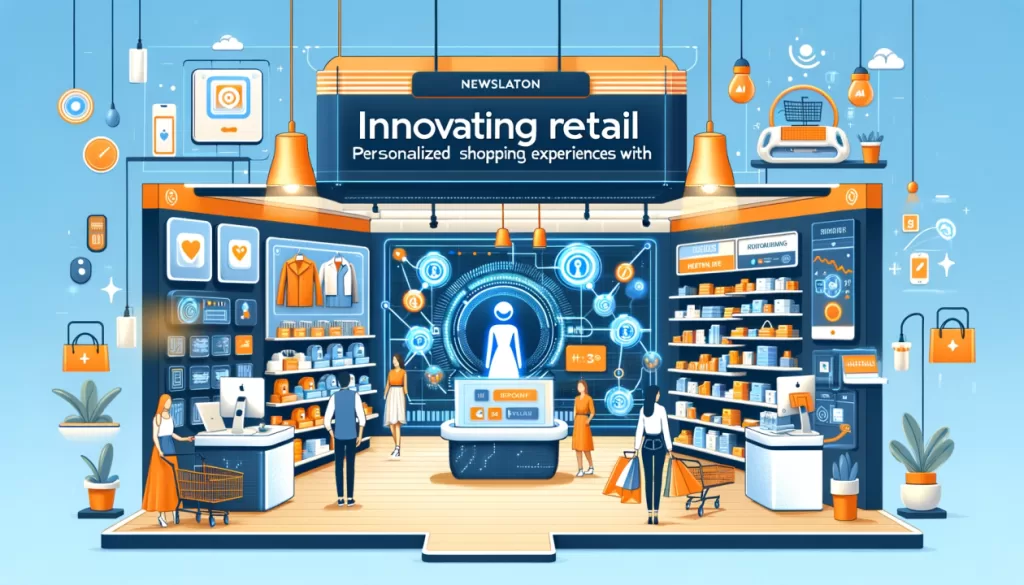In 2024, artificial intelligence (AI) has become a transformative force in the retail industry, revolutionizing the way businesses approach marketing. From personalized customer experiences to predictive analytics and optimized campaigns, AI is enabling retailers to engage consumers in ways never thought possible. As AI technologies continue to advance, retailers are seeing significant growth by harnessing data-driven insights and automation to enhance their marketing strategies. This post explores the key ways AI is reshaping retail marketing in 2024 and the incredible impact it’s having on business growth and customer engagement.
1. Personalized Customer Experiences: The Heart of AI in Retail

At the forefront of AI’s impact on retail marketing is the ability to deliver highly personalized customer experiences. In 2024, personalization is no longer limited to recommending products based on past purchases. AI now empowers retailers to understand customer behavior in real time, enabling hyper-targeted marketing efforts that feel intuitive and tailored to individual preferences.
For example, AI’s impact on retail marketing is evident as AI-driven systems analyze vast amounts of customer data — from online browsing habits and purchase history to social media activity and even geolocation data By processing this information in real-time, AI’s impact on retail marketing allows retailers to predict what products or services a particular customer might be interested in, delivering personalized offers, discounts, and content that cater to the customer’s unique needs. This capability highlights how AI’s impact on retail marketing is revolutionizing personalized marketing strategies.
This shift from generic to individualized marketing highlights AI’s impact on retail marketing, enhancing the customer experience and boosting engagement and loyalty. Personalized marketing campaigns powered by AI’s impact on retail marketing see higher click-through and conversion rates because they resonate more effectively with consumers. This demonstrates how AI’s impact on retail marketing is improving the effectiveness of personalized strategies.
2. Predictive Analytics: Driving Smarter Decisions
AI’s impact on retail marketing is evident in predictive analytics, which has become a cornerstone of retail marketing strategies in 2024. By leveraging historical data and machine learning algorithms, AI’s impact on retail marketing allows AI to predict future customer behavior with remarkable accuracy. This enables retailers to make smarter decisions in areas such as inventory management, product recommendations, and even customer retention.showcasing the transformative power of AI’s impact on retail marketing.
For example, retailers can use AI’s impact on retail marketing to anticipate demand spikes for certain products based on historical sales data, seasonal trends, and external factors such as holidays or weather patterns. This level of foresight demonstrates AI’s impact on retail marketing, allowing retailers to stock up on inventory accordingly, avoiding the dreaded out-of-stock scenario and improving supply chain efficiency
Moreover, predictive analytics can help marketers understand when a customer might be about to churn — that is, stop purchasing from the brand. By identifying these at-risk customers, retailers can implement retention strategies, such as offering personalized discounts or loyalty rewards, to re-engage and keep them coming back. This proactive approach to customer retention ensures that retailers can maintain strong relationships and reduce churn rates.
3. Optimized Marketing Campaigns with Artificial Intelligence Automation
In the competitive landscape of retail, marketers are always seeking ways to optimize their campaigns for maximum efficiency and return on investment (ROI). In 2024, AI automation has emerged as a game-changing tool for optimizing marketing campaigns across various channels, including email, social media, search engines, and e-commerce platforms.
AI-powered marketing automation tools can now create, manage, and adjust campaigns in real time based on performance data. For instance, AI can analyze which email subject lines are resonating with recipients and automatically adjust future emails to improve open rates. It can also determine which social media ads are generating the most conversions and allocate more budget to those ads while pausing underperforming ones.
By automating these tasks, AI allows marketing teams to focus on strategy and creativity rather than getting bogged down by repetitive tasks. Additionally, AI’s ability to optimize campaigns based on real-time data ensures that marketing efforts are always aligned with consumer behavior, leading to better results and more efficient use of resources.
4. Artificial Intelligence-Driven Chatbots: Enhancing Customer Engagement
AI-driven chatbots have seen a significant evolution in 2024, playing a key role in retail marketing by enhancing customer engagement and support. Unlike the chatbots of the past, which were often limited in their responses, today’s Artificial Intelligence-powered chatbots are capable of handling complex customer inquiries and providing personalized assistance 24/7.
These chatbots use natural language processing (NLP) to understand customer questions and provide accurate, context-aware responses. Whether it’s helping customers find a specific product, answering questions about shipping, or offering personalized recommendations, AI-driven chatbots ensure that customers receive instant, helpful assistance at any time of the day.
Moreover, chatbots can collect valuable data about customer preferences and behavior, which can be fed back into Artificial intelligence systems to improve future marketing efforts. By offering seamless, personalized interactions, AI-powered chatbots enhance the overall customer experience, leading to increased satisfaction and higher conversion rates.
5. Visual Search and Artificial Intelligence-Driven Product Discovery
Another exciting AI innovation in retail marketing is the rise of visual search technology. In 2024, consumers are no longer limited to text-based searches; instead, they can now upload images or take photos of products they like and find similar items through visual search engines powered by AI.
For example, a customer might take a picture of a dress they saw on social media and use a visual search tool on a retail website to find a similar product. Artificial Intelligence algorithms analyze the image to identify key attributes, such as color, pattern, and style, and then recommend products that match these characteristics.
This AI-driven approach to product discovery offers consumers a more intuitive way to shop, especially when they don’t know the exact name or description of a product. For retailers, visual search opens up new opportunities to capture customer interest and drive sales by offering relevant product recommendations based on visual cues.
6. Data-Driven Insights: Fueling Growth and Innovation
AI’s ability to process vast amounts of data in real time provides retailers with invaluable insights that can fuel growth and innovation. By analyzing customer data, Artificial Intelligence can identify trends and patterns that humans might miss, offering retailers a deeper understanding of their target audience and market dynamics.
For example, AI can analyze social media conversations to gauge customer sentiment about a brand or product. Retailers can then use this information to fine-tune their marketing messages, address customer concerns, or capitalize on emerging trends.
Furthermore, AI can help retailers discover new market segments or opportunities for expansion by identifying patterns in customer data. This data-driven approach enables retailers to make more informed decisions about product development, marketing strategies, and customer outreach, ultimately driving growth and profitability.
Artificial Intelligence is the Future of Retail Marketing
In 2024, Artificial Intelligence is undeniably reshaping retail marketing, providing businesses with the tools to create personalized experiences, optimize campaigns, and predict customer behavior. From AI-driven chatbots and visual search tools to predictive analytics and marketing automation, retailers are leveraging AI to stay competitive in a fast-evolving market.

